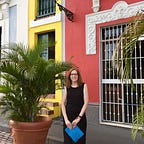Screen Doors Won’t Protect You
Why the outdoors strike fear into the hearts of city-dwellers
Lying awake at night in a cabin overlooking the lake, my heart pounded with anxiety despite the crickets chirping and moonlight filtering through the trees. It was supposed to be a relaxing weekend with friends, but I couldn’t focus on the pleasant breeze coming through the screened windows. All I could think about was how easy it would be for a serial killer to get into my room, as I listened for footsteps along the gravel road behind the property.
This doesn’t make any logical sense given that I live in New York, a city of 8 million people with a higher crime rate than most other cities in the U.S. But it’s happened multiple times — in fact it happens every time we go camping in the Catskills near the Hudson Valley. I’ll be lying there in the tent thinking about how little protection the nylon and zippers offer from an ax murderer hell-bent on getting into the campground and wreaking havoc. Then I’ll think about whether my husband will be able to protect me, and which side of the tent the killer would most likely strike first. I don’t know if my husband would be amused or horrified to know that this irrational fear also affects which side of the tent I choose.
Where does this come from? The more I talk to people about it, the more I realize that it’s a common, albeit strange, reaction by people who live in the city when we leave our concrete-box apartments. Take my apartment: It has two locked doors and security cameras at street level, then we have two locks on steel door at the entrance of our apartment itself. There is no other way in or out of the apartment outside of scaling a five-story building to break into the sliding glass doors on our narrow balcony — which are kept locked at all times, regardless. You would think this would make me feel trapped, but it doesn’t. There is a sense of safety in all the glass, concrete and steel of our apartment building, in the knowledge that there are cameras and locks — and cell phones to dial 911.
There is something to be said, too, for the proximity of neighbors. I don’t know all of my neighbors well enough to invite them over for dinner, but we’re on a first name basis with nearly everyone in my building. I can hear our neighbor across the hall laughing hysterically at certain TV shows in the evening, and I greet the dogs in our building with as much enthusiasm as the babies and toddlers. It isn’t that I think about how they would come to my rescue if someone broke into our apartment — would they know, while it was happening? — but that there is safety in numbers. Or that a building full of people means would-be intruders are more likely to be spotted than a lonely country road in an isolated area.
When we city mice are dropped into the country we feel exposed by the lack of security, fearful of open spaces. We are not comforted by the thin membranes of screen doors and nylon tents, and we feel unmoored by the lack of solidity. Rather than relaxing and enjoying a connection with nature and the feeling of earth beneath us, our heart rates pick up and our minds swirl with the endless possibilities of being attacked or threatened. It isn’t agoraphobia, which is often mistakenly described as a fear of large open spaces but in fact more often relates to fear of crowded spaces, public transportation, or leaving your house. In contrast, we are comforted by the presence of other people and unnerved by being alone.
On the face of it, none of this makes logical sense. When pressed, the same people who share my fear of wide open spaces will admit that it’s a complete fallacy to think that we are safer in a city where despite the drop in crime rates since the 1970s, people still get stabbed on the subway and held up at gunpoint on the street. But the logical is overtaken by our base fears when we’re lying awake at night, and perhaps there is an element of fundamental human truth to the anxiety.
In the city, we feel comforted by our steel and concrete boxes; safe within our sandwiched walls of glass and steel; cocooned within a floor, a building, and a neighborhood full of other people. And we are acutely aware of our surroundings; I know where the threat would come from physically, even if I can’t predict what or when that thread would be. In fact, feng shui practices take this into account, recommending that your bed always faces a certain way so that when lying in bed you have the widest possible view of the room and face the door. We can’t relax unless our back is against a wall, until we know can face our foes head-on when they appear.
It isn’t hard to imagine our ancestors finding shelter in caves, under overhangs and against fallen trees when they needed to rest or sleep. So, too, do we seek stability and protection when we are most vulnerable. Perhaps there is something we could do to offset this fear, knowing that the benefits of getting outdoors and communing with nature far outweigh the moments of anxiety urbanites feel when we’re outside of our normal surroundings. But building boxes around ourselves isn’t the point of being outdoors and detoxing from our hectic, always-on lives.
So next season, maybe I’ll try meditating on the healing properties of fresh air and earth, rather than focusing on the lack of a wall behind me or a door to protect me… Or maybe I’ll just point my husband toward the imagined danger and hope for the best.
